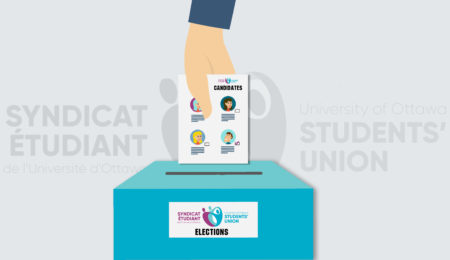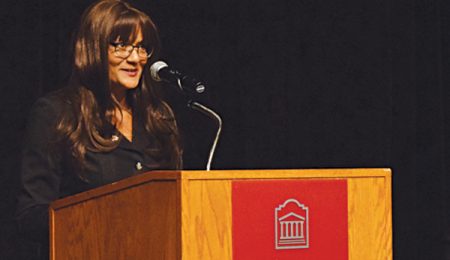CREATION OF TWO NEW PROGRAMS ON THE HORIZON, RESULTS OF STUDENT SATISFACTION SURVEY RELEASED
The University of Ottawa’s senate will discuss the results of a student satisfaction survey and the creation of two new programs at their upcoming June meeting. The meeting will be held on June 10 in Desmarais room 4101 from 3 p.m. to 5.
Here’s what you need to know from the documents the senate will be discussing.
Student satisfaction report: results
The senate will unpack the results of an online student satisfaction survey conducted from September 2018 until this April.
In total, the university received just over 1,750 comments over the eight-month span, spurring a number of recommendations from the survey’s action group. The action group is made up of a blend of students, faculty and staff.
When it comes to academics, many comments honed in on the late posting of exam schedules, while others focused on a “deficient” course evaluation process.
“These evaluations come far too late in the term,” one anonymous student wrote in the report, noting professors don’t have time to implement feedback before a course comes to an end. “It would be appropriate for these evaluations to be carried out as early as mid-term exams and for professors to have faster access to student feedback.”
Some comments dealt with certain professors directly.
Professors in the faculty of social sciences received the most comments with 41, followed by science (31), arts (24) and education (21). The faculty of medicine had the lowest, with two comments.
“I had professors plagiarizing the content of their courses, professors reading their presentations in class without even facing the students,” one anonymous student wrote of an unnamed professor. “This is unacceptable and does not make me want to do a master’s degree here.”
Poor academic support was also a common theme, highlighted 119 times, the report says. The faculty of social sciences received most of these comments at 21, followed by engineering (20), education (17) and science (15).
Others criticized a low availability of courses, especially online courses, and the late publication of summer term schedules.
The survey also allowed students to respond to services on campus.
Sixty-seven comments were directed toward the Student Academic Success Service (SASS) in relation to mental health support, focusing on difficulty accessing care and lack of awareness for mental health issues, the report says. Fourteen similar comments dealt with The U of O Health Services connected to difficulty accessing physicians for mental health support.
“Access to mental health services is very complex and discouraging (despite the changes) due to a lack of space and long queues before receiving a service,” an anonymous student wrote.
Others critiqued the university’s website, seen as “difficult to navigate,” the report says.
The university received about 800 comments related to infrastructure on campus, most frequently related to maintenance and repairs along with snow removal.
Other comments critiqued study spaces and the library, calling for more space, silent areas and electrical outlets.
The report concludes by recommending the satisfaction survey become a permanent structure on campus.
Student satisfaction report: recommendations
The satisfaction survey’s action group made 10 recommendations in their report:
- Feedback with teachers: “It became clear to use that, in a large number of cases, the problem is a breakdown in communication between the professor and the students,” the group writes in the report. They recommend providing access to a tool in BrightSpace where students can provide real-time feedback anonymously to teachers.
- Undergraduate engineering firms: “The quality of service provided by the faculties’ undergraduate engineering offices … is poor, especially at the beginning of the term,” the group writes. They recommend the office develops service quality standards, such as average response time and a queuing system.
- End-of-term exam schedule: “Students have difficulty planning their end-of-term travel because the exam schedule is published late,” the group says, recommending bumping up the publication of the exam schedules and posting them on their ‘important dates’ webpage. They suggest the day before Thanksgiving break in the fall and the beginning of reading week in the winter.
- Summer courses: “There is insufficient supply of summer courses and their timetables are often published only at the beginning of April, which causes a problem for the planning or completion of a diploma,” the group says. A date of publication of the course offering and schedules should be added to the U of O’s ‘important dates’ webpage as well, they recommend.
- Study areas: “Students want more study areas to prepare for mid-term and end-of-term exams and better compliance with … silent zones,” the report reads. The action group recommends adding more study space in the library and increasing awareness of classroom study areas too.
- Mental health services: “Students complain about the lack of access to mental health services and do not seem to know where to go for the help they need,” the report notes. The action group recommends increasing awareness of SASS’s ‘stepped care’ model and a new communication strategy to explain services offered at Health Services and off-campus.
- Smoke-free campus: “The fact that the University is not a smoke-free campus and that smoke-free zones are not respected is disappointing for more than thirty students,” the group says. A smoke-free consultation was held this fall, but the results have yet to be released. If the U of O does not become a smoke-free campus, the report says, it must adopt stricter measures regarding smoking areas.
- Electronic device charging site: “There is a shortage of functional sites for charging electronic devices in classrooms and study and rest areas,” the group says, recommending the installation of more.
- Food court at Learning Crossroads: “The quality and speed of services and the quality of food (at Learning Crossroads) are the subject of much criticism,” the report says. While improvements were implemented in the winter semester, the report says, the action group suggests better communicating these improvements.
- Help lines: “Many comments … are related to the fact that students don’t seem to know who to contact to report a technical problem, emergency or call for help” but “several help lines currently exist on campus.” The group recommends conducting a study of the help lines offered on campus and developing a communication strategy to raise awareness surrounding them.
Two new PhD programs on the horizon
The senate will also discuss the potential creation of two new programs at the university: a PhD in social innovation through both St. Paul University and the U of O and a PhD in interdisciplinary research in music through the U of O.
The social innovation PhD has been in the works since September 2017 and hopes to start its first cohort of three students in the fall 2020 semester.
“For several decades, the sectors of the economy and social innovation have been growing steadily in Canada and other countries” but schools “do not offer programs with a profile specifically focused on in-depth research about organizations driving social innovation,” the proposal reads in French.
“In short, the PhD in Social Innovation aims to equip students with state-of-the-art conceptual tools that will enable them to analyze social problems, conceptualize structural changes, and plan possible pathways for realizing social problems.”
Similarly, the PhD in interdisciplinary research in music has also been brewing since September 2017 with hopes of launching in the fall 2020 semester with four students.
“This program prepares our graduates for leadership roles in a society where music culture is undergoing rapid changes,” the proposal reads.
The core of the program will focus on music while also blending an interdisciplinary study of a student’s choosing, such as popular culture, race, gender and sexuality studies, or political science, the proposal says.
A new name for a general bachelor of arts degree
The faculty of arts hopes to change the general degree it gives out to a “bachelor of interdisciplinary studies.”
The proposal document says the change came from the realization that one of the two major cohorts the degree attracts is students who like how open-ended the general BA is, allowing them to study a range of different subjects.
“The name ‘Interdisciplinary Studies’ reflects the unique possibilities in this BA: to take courses across disciplines in the Arts as well as in other Faculties,” the proposal reads. It adds the faculty hopes to have the exact structure of the program confirmed by September.
Following this meeting, the senate is set to meet next on Sept. 23.





